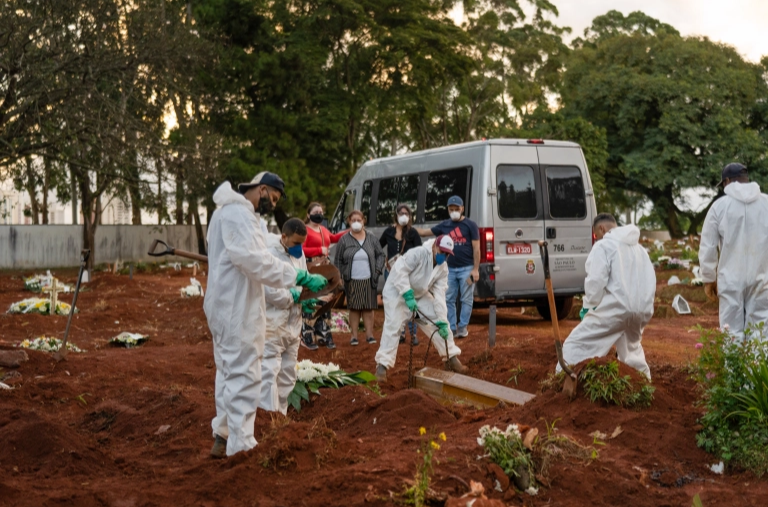
Brazil's Vila Formosa cemetery has seen a surge in burials as April became the country's deadliest month since the coronavirus pandemic began [Avener Prado/Al Jazeera]
Sao Paulo, April 30 (RHC)-- Brazil has surpassed 400,000 coronavirus-related deaths, the second-highest total in the world after the United States. More than half of those were recorded in 2021, while April has been the deadliest month since the start of the pandemic.
Experts blame several factors for the recent uptick, including the more contagious P1 variant, fatigue with restrictive measures such as lockdowns, and slow vaccine rollout. “With 50 percent of the deaths from COVID happening this year, it shows that the crisis is totally out of control,” Jesem Orellana, an epidemiologist with the Fiocruz medical research institute in the Amazonian capital of Manaus, told reporters.
Manaus is where the P1 variant was first detected and where in January patients died in their beds asphyxiated due to inadequate oxygen supplies. Brazil’s far-right populist President Jair Bolsonaro’s response to the crisis, which included downplaying the severity of the disease and casting doubt on masks and vaccines, has been condemned by health experts worldwide.
A Senate commission opened an inquiry this week into the government’s handling of the pandemic. “We’ve suffered here a lot with access to information and fake news, like the virus is just a little flu,” said Andre Ferreira, a community leader with Brigada Pela Vida (Life Brigade), an NGO that does COVID-19 outreach in poor communities across Sao Paulo.
Meanwhile, thousands of families continue to suffer each day as their loved ones die. Socioeconomic conditions in Brazil, one of the world’s most unequal countries, continue to be a deciding factor in who bears the brunt of coronavirus deaths.
The death rate per 100,000 people in Sao Paulo’s Sapopemba district, where Fazenda da Juta is located, is three times higher than in the city’s trendy Pinheiros neighbourhood, according to a study published earlier this year in the International Journal of Epidemiology.
“Of all the ways that a person can work or can study safely, it’s much more difficult for the poor,” said Marcelo Neri, an economist at Brazil’s Getulio Vargas Foundation.
Back in Fazenda da Juta, Martins said her father has struggled to cope since her mother passed away.
Martins still lives below her parents’ home, a common arrangement for many families across Brazil, especially in low-income neighbourhoods, and she said she tries to remember better days.
“She used to just call down to me for things she needed, like garlic, something she’d forgotten to get at the shops,” Martins said, about her mother. “I miss those calls now.”

